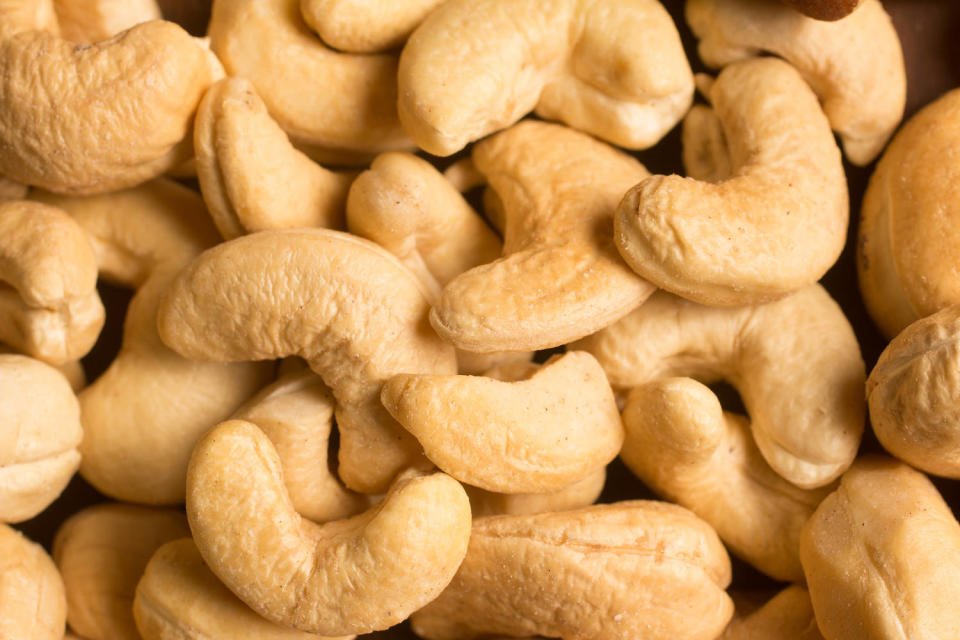These are 6 healthiest types of nuts, according to a dietitian
Nuts are one of the best sources of healthy plant-based fats. They're a satisfying snack that are good for your heart and brain, but not all nuts come with the same nutrition profile. Some are higher in protein and others have certain micronutrients that make them shine.
Whether you eat them by the handful, toss a few on top of a salad, use crushed nuts to coat a protein like salmon, or have a love of nut butter, you can rest assured that all nuts are good for you. But nutrition professionals agree that these nuts stand out among the crowd.
Almonds
Almonds are one of the highest protein nuts boasting 6 grams per ounce. They're rich in fiber, magnesium, and vitamin E — nutrients that play a role in digestion, heart health, and skin health. The healthy unsaturated fat in almonds is good for the heart and helps with blood sugar control.
The combination of protein, fiber and healthy fats makes almonds a filling snack for anytime of the day. And a 1-ounce serving size is about 23 almonds, which is more than many other nuts. Almonds are a crunchy and rich addition to salads and pastas.
Walnuts
“(Walnuts) are an excellent plant source of omega-3 fats, which can promote healthy blood pressure, cholesterol, and triglyceride levels,” says Anne Danahy, a Scottsdale-based registered dietitian specializing in healthy aging and the Mediterranean diet. More specifically, Michelle Routhenstein, a preventive cardiology dietitian at EntirelyNourished.com says that walnuts are rich in the amino acid L-arginine as well as ALA (a type of omega-3), both of which support cardiovascular health by improving blood vessel function, reducing inflammation, and lowering blood pressure.
“Walnuts are also great for your gut microbiome since they contain compounds that feed beneficial gut bacteria,” Danahy says. Researchers are also exploring ways walnuts might help reduce colorectal cancer risk.
An ounce of walnuts is about 14 nuts and has 185 calories, 4 grams of protein, 2 grams of fiber and a good source of magnesium. “I enjoy preparing walnut-stuffed dates by simply removing the pits from the dates and filling them with whole walnuts, creating a delightful combination of nuttiness and sweetness for dessert,” says Routhenstein. Or you can use them as a filling topper on a simple salad.
Brazil nuts
Brazil nuts are definitely not as popular as many of the other nuts on the list, but eating just two of these large nuts has big benefits. Brazil nuts provide more than double the daily dose of selenium, a trace mineral that plays a role in thyroid function, DNA synthesis, and anti-inflammatory processes. Many people don’t think about their selenium intake, so it’s worth starting your day with two Brazil nuts.
Pistachios
Pistachios are another high protein nut clocking in with 6 grams per ounce. These green nuts also have plenty of B vitamins and 3 grams of fiber per serving. And here's a fun fact: pistachios get their green hue from two plant compounds — lutein and zeaxanthin — which have been linked to eye health and brain health. These antioxidants also fight inflammation in the body.
A one-ounce serving of pistachios is about 49 nuts, so feel free to snack on a few handfuls. Or blend them up into a tasty green whipped feta dip.
Pecans
“Pecans are so unique and versatile, and it pains me that so many people don’t use them for anything other than Thanksgiving pies and holiday cookies,” says Christine Byrne, a registered dietitian and the owner of Ruby Oak Nutrition in Raleigh, NC. Like most of the nuts on this list, pecans are rich in unsaturated fat and good for the heart.
“In a small four-week study of older adults, daily pecan consumption was linked to healthier cholesterol levels, which the study authors say could be helpful in reducing the risk of heart problems,” notes Byrne. “Pecans are considered heart healthy due to their high ORAC score (a measurement of antioxidants), which help reduce oxidative stress and inflammation, thereby supporting cardiovascular health,” notes Routhenstein.
“I love their buttery texture and subtly sweet flavor, and the fact that you can crumble them on top of a salad or a yogurt bowl with your hands — no knife or cutting board required,” says Byrne. To increase the enjoyment factor of pecans, try this simple Smoky Spiced Pecans recipe for snacking.

Cashews
Cashews are a large soft nut that has good levels of magnesium, a mineral that is vital to nerve function, blood pressure control and blood sugar management. “A review of five existing studies found that eating cashews might help lower blood pressure, which can improve heart health,” says Byrne.
Due to their soft texture, cashews are often used as a dairy alternative in plant-based recipes, such as in this vegan cheese sauce. You can also add cashews to stir fry for texture and nutty flavor.
This article was originally published on TODAY.com
